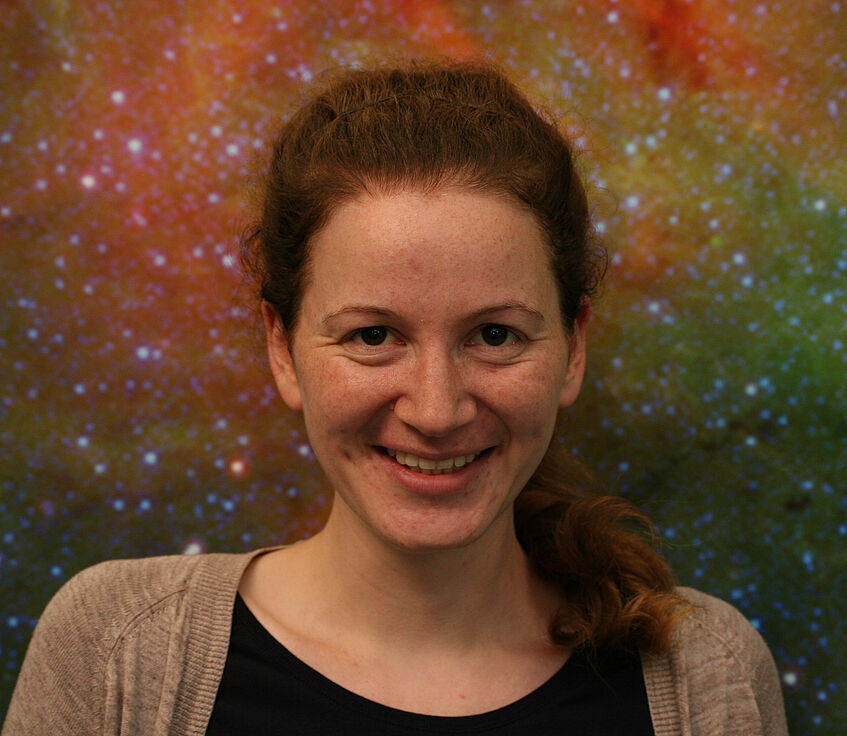Welcome Anne Hutter to the Department of Astrophysics!

(C) Anne Hutter
Welcome Anne Hutter to the Department of Astrophysics!
Anne Hutter’s appointment as an assistant professor comes at an exciting time for understanding the Universe’s infancy, particularly its first billion years.
The recently launched James Webb Space Telescope has already presented us with intriguing puzzles — one of them being the detection of a larger number of bright galaxies than predicted by current models and simulations. In her projects, Anne will investigate which physical processes in these early galaxies— especially those related to star formation — might have differed to give rise to these unexpected observations.
To tackle this challenge, Anne will use a semi-numerical simulation framework to develop and implement new models for star formation and gas. These models will consider different possible phenomena, such as a higher fraction of gas converting into stars, the formation of more massive stars, star formation occurring in intense bursts, and changes in dust distribution and composition (e.g. dust being pushed away or absorbing less light due to larger grain sizes).
The goal is to more accurately capture the complex interplay of physical processes in early galaxies and to test how these modify the observed light from these galaxies.
A complementary approach will be to investigate the footprints that changes in early galaxy physics leave on the ionization state of the intergalactic hydrogen gas. Observations from radio interferometers like the Square Kilometer Array — which is currently under construction and will start observations within a few years — will be crucial, as they will provide detailed maps of neutral hydrogen gas on large scales.
By exploring the impact of galaxy physics on early galaxy evolution and reionization models through semi-numerical modeling, Anne will investigate how state-of-the-art observations can help constrain the processes shaping galaxies during our Universe’s first billion years.
For the last three years, Anne was a DAWN fellow at the Cosmic Dawn Center of the Niels Bohr Institute in Copenhagen, Denmark. Before that, she was a postdoctoral researcher from 2018 to 2022 at the Kapteyn Astronomical Institute in the Netherlands and from 2015 to 2018 at the Center for Astrophysics and Supercomputing in Australia. She completed her PhD in 2015 at the Leibniz Institute for Astrophysics in Potsdam, Germany.
What brought Anne to pursue a career in Astrophysics?
My interest in astrophysics began when I was a teenager. To this day, I’m not sure what came first — my fascination with space or the curiosity sparked by watching Star Trek around the age of 14. I was captivated by how theoretical models could describe and predict complex phenomena. However, during my studies in physics (at the time, there was no dedicated study program for astronomy/astrophysics in Germany), I explored other areas — partly due to doubts about whether I was suited for theoretical work, which led to a Bachelor's thesis in experimental surface physics, and partly due to my interest in theoretical models, which led to a research project in quantum optics overseas. Even when it came time to choose my Master's thesis topic, the decision between astrophysics and quantum optics was a close one. In the end, astrophysics won by a narrow margin … perhaps because a certain science fiction series had left a lasting impression.
Anne’s advice to students starting their academic journey:
Follow your passion and curiosity. A career in science can be incredibly rewarding, but it also comes with intellectual and emotional challenges. Talk to your peers — most likely they go through similar experiences, and supporting each other can make a huge difference. It is easy to get completely absorbed in fascinating questions and complex problems, but it is just as important to nurture a life outside of science. Make time for things that recharge you, whether that is spending time with friends, playing music, doing sports, crafting, or anything else you enjoy. One thing I learned along the way: it is okay to say no to requests before things start to feel overwhelming. Taking care of your well-being helps you sustain your passion and curiosity, essential for driving your scientific career in the long run.
We celebrate the incorporation of Anne Hutter into the academic staff of our department and look forward to the exciting results her research will bring.
